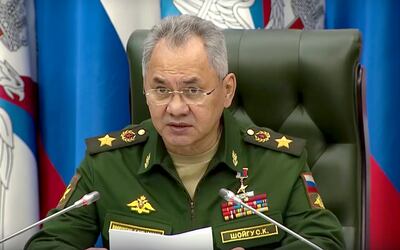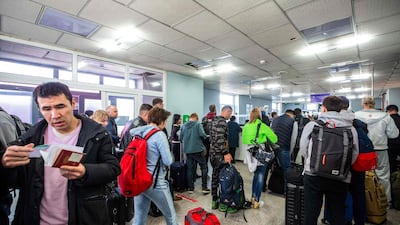Allies of Russian President Vladimir Putin have expressed concern about “excesses” in his controversial plan to mobilise 300,000 men to fight in Ukraine.
The country’s two most senior politicians publicly addressed the disquiet surrounding reports that people who have no military experience are being called up.
Mr Putin last week issued the mobilisation order to replenish his army, which has in recent weeks suffered heavy losses on the battlefield in Ukraine, with defending forces retaking vast amounts of territory.
Russian Defence Minister Sergei Shoigu issued a guarantee that only men with special military skills or combat experience would be summoned as part of the mobilisation.
But there has since emerged a string of complaints about men with no training being issued with draft papers, prompting a backlash — including from Kremlin loyalists.

Russia's top two parliamentarians, both close allies of Mr Putin, explicitly addressed public anger at the way the mobilisation drive was unfolding. Valentina Matviyenko, the chairwoman of Russia's upper house, the Federation Council, issued a rebuke on Telegram to say she was aware of the reports.
"Such excesses are absolutely unacceptable,” she said about the cases of inexperienced men being drafted. “And, I consider it absolutely right that they are triggering a sharp reaction in society."
In a direct message to Russia's regional governors — who she said had "full responsibility" for implementing the call-up — she wrote: "Ensure the implementation of partial mobilisation is carried out in full and absolute compliance with the outlined criteria. Without a single mistake."
Vyacheslav Volodin, speaker of the State Duma, the lower chamber of parliament, also expressed concern in a separate post.
"Complaints are being received," he wrote.
"If a mistake is made, it is necessary to correct it ... Authorities at every level should understand their responsibilities."
Mr Shoigu said nearly 6,000 troops had been killed since February, but some western analysts believe the figure could be much higher. The Pentagon in August said up to 80,000 Russians may have been killed or wounded since Moscow ordered its forces to advance earlier this year.
Mass protests sprung up after the Kremlin last week unveiled its mobilisation plan. More than 2,000 demonstrators have been arrested at rallies, rights groups said. More rallies were recorded on Sunday in Russia’s Far East and Siberia.
The country’s largest mobilisation since the Second World War has led to military-age men fleeing the country in droves, causing tailbacks at border crossings and flights to sell out.
Meanwhile, Ukrainian President Volodymyr Zelenskyy called on draftees to resist the call to go to war. Speaking in Russian during his nightly address late on Saturday, he said: “Not accepting a draft notice is better than dying a war criminal on foreign land.”
He also urged Russian troops fighting in Ukraine to lay down their arms, and offered guarantees that they would be treated fairly.
“Ukraine guarantees three things to every surrendering Russian soldier,” he said.
“First: you will be treated in a civilised manner, in accordance with all conventions.
"Second: no one will know the circumstances of your surrender, no one in Russia will know your surrender was voluntary.
"And third: if you are afraid to return to Russia and do not want an exchange, we will find a way to ensure this as well. Ukraine will do everything for its victory. And every Russian citizen must understand: no tricks will help the occupier. I promise you.”
Russia sought to defend its seven-month war at the UN General Assembly in New York, with Foreign Minister Sergey Lavrov saying on Saturday that regions of Ukraine where widely derided referendums are being held would be under Moscow’s "full protection" if they are annexed.
Mr Lavrov also criticised the West’s response to the war in Ukraine, saying the US, EU and Nato “cannot claim to have a neutral status; they cannot assert that they are not participating in the conflict”.
An agreement signed by Russia and Serbia last week has landed the Balkan nation in hot water, as it seeks to become a member of the EU. Serbia’s foreign minister on Sunday sought to play down the importance of the deal which will involve the two countries consulting each other on foreign policy matters.
Nikola Selakovic signed the pact on Friday along with Mr Lavrov on the sidelines of UNGA where most western delegations shunned Russia's senior diplomat.
Mr Selakovic said on Sunday that the deal is a “technical” one and relates to bilateral ties, but not security issues. He insisted that Serbia has been signing similar documents with Russia since 1996.
“The government could have rejected such a plan but there is nothing contentious in it,” he added. “It is being criticised by those who haven’t seen it.”
The consultation plan covered by the agreement is expected to last for two years, Serbia’s Foreign Ministry said on Friday. Serbia officially is a candidate for EU membership, but the government maintains good relations with Russia.












